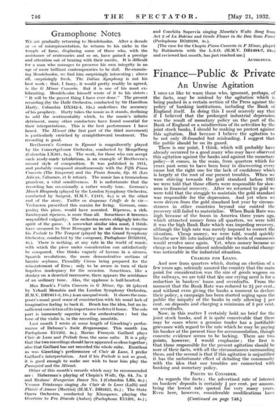Gramophone Notes
WE are gradually returning to Mendelssohn. After a decade or o of misrepresentation, he returns to his niche in the temple of fame, displacing some of those who, with the assistance of centenaries and so on, have gained a prestige and attention out of bearing with their merits. It is difficult for a man who manages to preserve his own integrity in an age of more brilliant contemporaries to be dull. Re-examin- ing Mendelssohn, we find him surprisingly interesting ; above all, surprisingly fresh. The Italian Symphony is not his best work : that, I fancy, it would pretty readily be agreed, is the G Minor Concerto. But it is one of his most ex- hilarating. Mendelssohn himself wrote of it to his sisters : " It will be the gayest thing I have ever done." The present recording (by the Halle Orchestra, conducted by Sir Hamilton Harty, Columbia DX342-4, 12s.) underlines the accuracy of his prophecy. Harty takes the music as it stands, declining to add the sentimentality which, to the music's infinite detriment, many other conductors have found essential for their interpretations. This is the best performance I have heard. The Minuet (the first part of the third movement) is particularly enriched by straightforward treatment. The recording is good.
Beethoven's Overture to Egmont is magnificently played by the Concertgebouw Orchestra, conducted by Mengelberg (Columbia LXI61, 6s.). The work, for those who can accept such ready-made tabulations, is an example of Beethoven's second style of composition. It was published in 1811, and probably composed simultaneously with the Fifth Piano Concerto (The Emperor) and the Piano Sonata, Op. 81 (Les Adieux, I" absence, et le retour). The music has a tremendous grandeur, a vital sensitiveness. It is unfortunate that the recording has occasionally a rather woolly tone. German's March Rhapsody (played by the London Symphony Orchestra, conducted by Sargent, H.M.V. C2411, 4s.) is at the other end of the story. Tailler en drapeaux l'etoffe de la vie- Vethaeren prescribed this maxim for living. German, com- posing this piece, would have assented. Ripeness, a rich, flamboyant ripeness, is more than all. Somethnes it becomes unqualified vulgarity. The orchestra enters obligingly into the spirit of the game. A somewhat similar idea must, I think, have occurred to Herr Honegger as he sat down to compose his Prelude to The Tempest (played by the Grand Symphony Orchestra, conducted by the composer, Parlophone R020184, 4s.). There is nothing, at any rate in the world of music, with which the piece under consideration can satisfactorily be compared. One thinks vaguely of hyenas in a sirocco, Spanish revolutions, the more demonstrative sections of lunatic asylums, Piccadilly Circus being prepared for the reinstatement of Eros ; only to be aware in turn of their hopeless inadequacy for the occasion. Sometimes, like a donkey on a deserted racecourse, there appears the semblance of an ordinary tune. Alas, the applause is half-hearted.
Max Brach's Violin Concerto in G Minor, Op. 26 (played br Yehudi Menuhin and the London Symphony Orchestra. H. M. V. DB1611-3, 18s.) is an unequal work. It shows the com- poser's usual good sense of construction with his usual lack of imaginative feeling to back it. Brach has the idea, but an in- sufficient conviction of its importance to drive it home. The solo part is immensely superior to the orchestration : but the tone of the violin is, in the recording, unsubtle.
Last month I wrote at some length of Gieseking's perfor- mance of Debussy's Suite Bergainasque. This month (on Parlophone E11202, 4s.), Marius Francois Gaillard plays Clair de Lune and Prelude from the same suite. It is a pity that the two recordings should have appeared so elOse together ; also that Gaillard has not recorded the whole suite. Excellent as was Gieseking's performance of Clair de Lune, I prefer Gaillard's interpretation. And if his Prelude is not so good, it is good enough to make one wish to hear him play the Passepied and the Minuet.
Other of this month's records which may be recommended are : Hnberman's playing of Chopin's Waltz, Op. 64, No. 2 and Brahms' Hungarian Dance No. 1 (Columbia LB8, 464 ; Yvonne Printemps singing Au Clair de la Lune (Lulli) and Plaisir d'Amour (Martini) (H.M.V. DB1625, 6s.) ; The State Opera Orchestra, conducted by Klemperer, playing the Overture to Fra Diavolo (Auber) (Parlophone E11201, 4s.) ; and Conehita Supervia singing Musetla's Waltz Song from Act 2 of La Bo 'Mite and Gentle Flower in the Dew from Faust (Parlophone 11020180, 4s.).
[The case for the Chopin Piano Concerto in F Minor, played by Rubinstein with the L.S.O. (H.M.V. DB1494-7, 24s.) and reviewed last month, has just reached me.] AUTOLYCUS.




































 Previous page
Previous page